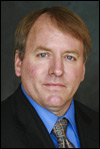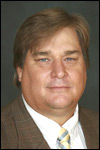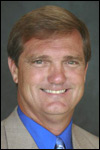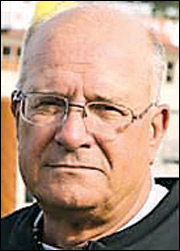Do the deal
<< Go back
In whatever way coaches and players discovered Vicknair’s work ethic, it stayed with them.
“Vic was definitely the mentor. He was the teacher,” Shaver said. “He was the guy that taught us all — not only made us learn football, but he taught us how to practice, how to work hard. Had I not been under him, I know my chances for success would have been very, very slim, because he showed me how to work.”
One of Vicknair’s favorite sayings — “Do the deal” — had multiple meanings, but the man who said it again and again demonstrated to those around him a tireless commitment to the assignment, including those self-imposed.
Shaver, who called him “a working machine,” recalled feeling guilty when he sat down to make out his practice schedule or start a phase of his program, because he knew Vicknair was already ahead of him.
“Even though he didn’t even know it, he made us work harder because we knew he was,” Shaver said. “Even if we weren’t playing him. Everybody would say, ‘Look how hard they’re working, and y’all are not working.’ He was that type of guy, and he had the ability to make you stay on top of things.”
Especially with those who worked for him.
“He could just look at you, and you knew you were supposed to be doing something else,” Shaver said.
Bruchhaus, who was on the staff at Barbe with Shaver when Vicknair was head coach, said Vicknair pushed assistants to the limit. It was something Bruchhaus got a taste of as a student teacher and coach for Vicknair a few years earlier at Westlake High, and Bruchhaus experienced it in greater detail as defensive coordinator at Barbe. He knew things would never be the same for him.
“Then it was on,” Bruchhaus said, grinning and laughing.
When you worked for Vicknair, Bruchhaus said, you didn’t do anything but coach. That was it. You went to work early in the morning, and late at night you were still coaching. It was seven days a week.
“I didn’t go into a store from probably July until December,” Bruchhaus remembered. “I can remember going to a store after the season, having to go buy clothes because I lost about twenty-something pounds during the football season.”
Vicknair hired Max Caldarera from Merryville in 1974 and brought him to Westlake. Caldarera worked for him for four years and succeeded him as head coach when Vicknair took over at Barbe.
“He brought me and Mike Ortego in together,” Caldarera said. “Mike was offensive coordinator. Vic was teaching me to be defensive coordinator. He called defense those first few years. That last year he pretty much turned it over to me.”
Thirty years later Caldarera was Vicknair’s boss at Westlake, hiring him as an assistant coach and giving him the job he had until the day he died.
“He knew only one speed when he was coaching,” Caldarera said. “Vic went after everything just full blast and didn’t accept failure from kids at all. They were going to do it right, and they were going to continue to do it until they did it right.”

|
MATT VIATOR
|
Matt Viator, who began coaching as a student teacher under Caldarera’s wing, then with Vicknair at Sam Houston High School, said Vicknair was a pioneer in Southwest Louisiana with respect to having players work hard in winter, spring and summer.
“He was one of the first ones to really major in offseason,” Viator said. “You didn’t just lift weights. You had the speed work, the conditioning, the weights, and how it all went together, and he was one of the first to make it a comprehensive program.”
Viator said Vicknair was one of the first coaches in the area to institute an athletic period during the school day, then a freshman athletic period, and one of the leaders in finding new ways to work the freshmen into the program.

|
LARK HEBERT
|
Lark Hebert played on the offensive line at McNeese, where Vicknair was an assistant coach after leaving Barbe in 1982. Vicknair was the position coach for Hebert, who nearly two decades later hired Vicknair to be one of his assistants at Sulphur High School. Hebert said Vicknair’s work habits set him apart and made the most lasting impression.
“If there was a team meeting at 2, the offensive line would meet with Vic at 1,” Hebert said of his playing days at McNeese. “If practice started at 3, we were going to be on the field at 2. When the rest of the team would come out for stretching, the offensive linemen were already soaking wet.” Hebert said Vicknair taught the players team play and work ethic, stressing they should leave no stone unturned.
“He was in great shape,” Hebert said as he recalled Vicknair coaching for him at Sulphur on the cusp of his seventh decade of life. “He always had great energy. It caught me by surprise.”

|
MIKE COLLINS
|
Mike Collins was a high school player in Ruston when he first met Vicknair. Pat Collins, Mike’s father, was a coach at Louisiana Tech, where Vicknair would bring his coaching staff to summer football camps. The relationship continued when Mike Collins became a McNeese assistant coach in the 1990s, while Vicknair was coaching at area high schools.
“I think anytime you were around him, you felt his energy,” Collins said, “because he had great energy. I think that’s important as a coach, and it seemed to affect everybody around him. It was a positive energy.”
Vicknair had an effective way of communicating, Collins said.
“He was going to make sure it was (done) right, but at the same time it made you feel good as a coach or as a player for him. It affected you in a positive way,” Collins said. “I don’t think there’s any question that just being around him and him having the energy he had at his age, still, and the passion that he had for football could not help but rub off on whoever was around him.”
Collins saw first-hand and heard from Vicknair’s assistants about the effort he required from himself and from them.
“He was just a real grinder when he worked at it,” Collins said, “and he expected his coaches (to do the same).”
Shaver said that’s an understatement.
“He never sat around,” Shaver said. “There was no down time for him. He was not a guy that would go sit on the couch all afternoon. He was doing something. He was drawing plays, he was out working in the yard, he was doing something. He didn’t sit around.
“On the other hand, me? I can sit for days. But he can’t do that.”
There, in that quote, is another telling piece of Vicknair’s reach. His pupils often speak of him in the present tense, and they were doing so a year after his death.
“I know he’s a hard worker,” said Hebert, sitting in his office at McNeese, where he was entrenched in his role as defensive coordinator when Vicknair died. “Probably the biggest thing with Coach Vic is you learn so much football from him. He teaches you how to be a coach and how to be professional and all that stuff.”

Discussion Area - Leave a Comment